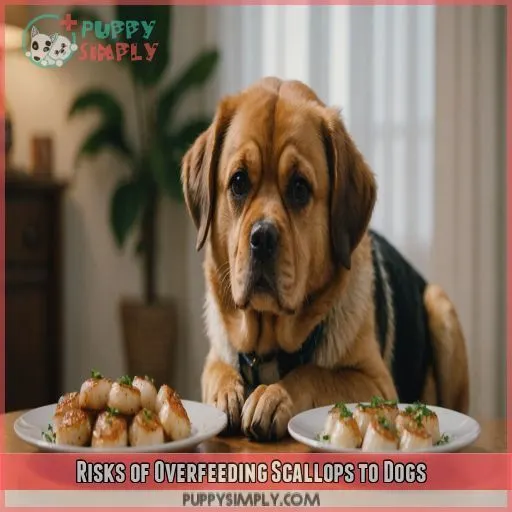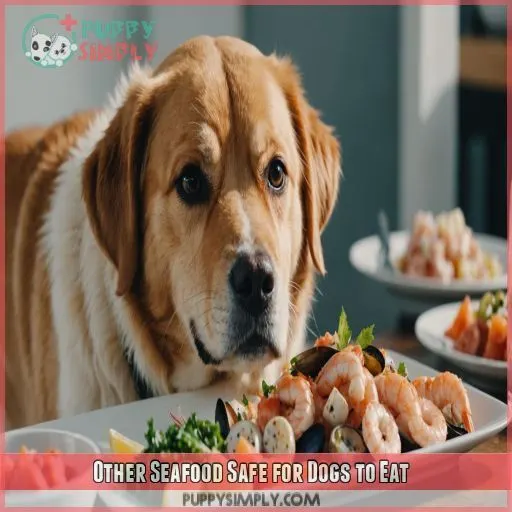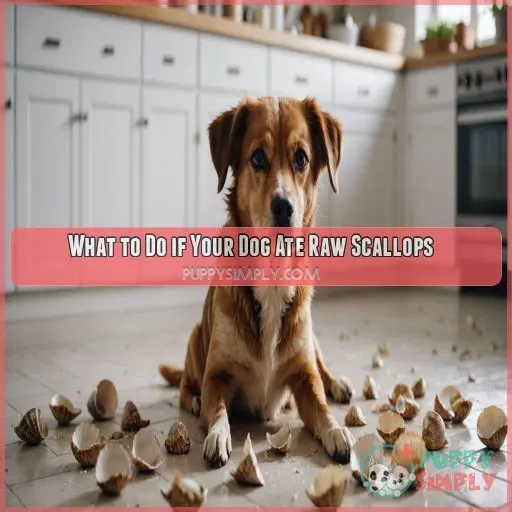This site is supported by our readers. We may earn a commission, at no cost to you, if you purchase through links.
 Good news—dogs can eat scallops! Cooked scallops are a great source of protein, potassium, and magnesium for your pooch. Just make sure they’re cooked thoroughly and served plain, without any salt, butter, or spices.
Good news—dogs can eat scallops! Cooked scallops are a great source of protein, potassium, and magnesium for your pooch. Just make sure they’re cooked thoroughly and served plain, without any salt, butter, or spices.
Want to know more about how to prepare scallops for your dog, how much is too much, and other seafood options? Keep reading.
Table Of Contents
- Key Takeaways
- Can Dogs Eat Scallops Safely?
- Risks of Overfeeding Scallops to Dogs
- Other Seafood Safe for Dogs to Eat
- What to Do if Your Dog Ate Raw Scallops
- Expert Advice on Feeding Scallops to Dogs
- Online Veterinary Advice: a Growing Trend
- Frequently Asked Questions (FAQs)
- Can dogs eat shrimp or scallops?
- What seafood is safe for dogs?
- How do you cook scallops for dogs?
- What should I do if my dog ate raw scallops?
- Can dogs eat scallops raw?
- How much scallop is too much for dogs?
- Can dogs eat other seafood like crab and lobster?
- What do I do if my dog ate scallops and is now unwell?
- How do I know if an online vet is qualified?
- Conclusion
Key Takeaways
- Scallops are a nutritious treat for dogs, packed with magnesium, potassium, protein, and phosphorus, which are essential for a dog’s growth and overall health.
- It’s important to practice portion control when feeding scallops to your dog. Start with a small amount and adjust as needed – they should be an occasional treat.
- Always cook scallops thoroughly and serve them plain, without any butter, salt, or spices, to avoid upsetting your dog’s stomach.
- While scallops are safe for dogs to eat, overfeeding can lead to digestive issues and potential health problems. Monitor your dog’s reaction and contact your vet if you have any concerns.
Can Dogs Eat Scallops Safely?
You might be wondering if it’s safe to share your tasty scallops with your furry friend. Well, the good news is that dogs can eat scallops, but there are some important things you need to know before you offer them this seafood treat.
Nutritional Benefits of Scallops for Dogs
Scallops are a nutritional powerhouse for dogs, offering a range of benefits to support their health.
They’re an excellent source of magnesium, potassium, protein, and phosphorus, all essential for a dog’s growth, especially during their puppyhood.
The vitamins in scallops support eyesight, bone growth, reproduction, and a healthy immune system.
Potassium helps regulate electrical charges in the heart, nerves, and muscles, while protein aids in muscle repair and tissue growth.
How Much Scallop is Good for Your Dog?
When giving your dog scallops, portion control is key. You don’t want to overfeed your furry friend and end up with a case of doggy indigestion.
As a rule of thumb, start with 1-2 small pieces for extra-small dogs (2-20 lbs). For larger dogs, you can increase the portion size accordingly: 2-3 pieces for small dogs, 5-6 pieces for medium dogs, and a handful for large and extra-large dogs. Remember, scallops should be an occasional treat and not a staple of their diet. Always keep an eye on your dog’s reaction and adjust the amount as needed.
How to Feed Scallops to Your Dog Safely
Now that you know how much scallop is appropriate for your dog, let’s figure out the safest ways to give this seafood treat to them. Here are some tips to make sure your furry friend enjoys scallops without any risks:
- Always cook the scallops thoroughly to get rid of any bacteria or parasites.
- Serve the scallops plain, without any butter, salt, or spices.
- Remove the shells completely to prevent choking hazards.
- Allow the cooked scallops to cool down before serving to avoid burning your dog’s tongue.
- Offer the scallops in small pieces to further reduce the risk of choking.
Risks of Overfeeding Scallops to Dogs
While scallops can be a tasty treat for your dog, overfeeding them can lead to some not-so-fun consequences. In this section, we’ll take a closer look at the potential risks of giving your dog too many scallops, so you can keep your furry friend happy and healthy.
Symptoms of Overfeeding Scallops
While scallops provide nutritional benefits to dogs, overfeeding can lead to health issues. Keep an eye out for these symptoms:
| Symptom | Potential Cause |
|---|---|
| Abdominal pain | Digestive upset |
| Cramps | Dehydration |
| Anemia | Malnutrition |
| Blood in urine | Internal injury |
| Loss of coordination | Neurological issue |
| Increased heart rate | Cardiac issue |
| Dehydration | Fluid imbalance |
| Anorexia | Loss of appetite |
| Bad breath | Digestive issue |
If you notice any of these symptoms, contact your veterinarian immediately. It’s better to be safe than sorry when it comes to your furry friend’s health!
Digestive Upset and Potential Health Issues
Overfeeding scallops to your dog can lead to digestive issues and other health problems. While scallops are a nutritious treat, too much of a good thing can cause an upset stomach and potential health risks.
Some dogs may experience diarrhea, vomiting, or pancreatitis after consuming too many scallops. These symptoms can be uncomfortable and may require veterinary attention. It’s important to monitor your dog’s reaction and adjust the amount of scallops you offer accordingly. Remember, scallops should be an occasional treat and not a regular part of their diet.
Other Seafood Safe for Dogs to Eat
So, what other seafood can your dog safely enjoy? Well, your furry friend can also indulge in crabs, lobsters, salmon, shrimp, and tuna (in moderation). But before you serve up a seafood feast, there are a few important things you need to know.
Crabs, Lobsters, Salmon, Shrimp, and Tuna
Your dog can also enjoy a variety of other seafood options in moderation, including:
- Crabs
- Lobsters
- Salmon
- Shrimp
Just remember to always remove any shells, legs, or tails before serving to prevent choking hazards and potential internal injuries.
Removing Shells, Legs, Tails, and Bones
While crabs, lobsters, salmon, shrimp, and tuna are safe seafood options for dogs, it’s really important to remove any shells, legs, tails, and bones to prevent choking and internal injuries. These parts can cause serious harm to your furry friend, so always take the time to prepare seafood safely before offering it as a tasty treat.
Avoiding Canned Tuna With Added Salt
While canned tuna is a safe seafood option for dogs, it’s important to avoid the following:
- Canned tuna with added salt or salt water: Excess salt can lead to health issues.
- Fresh tuna: It’s best to avoid fresh tuna due to potential mercury levels.
- Homemade treats: Avoid adding tuna to your dog’s diet without consulting a veterinarian.
- Dog food ingredients: Be cautious of dog food brands that include tuna, as it may be an indicator of lower-quality ingredients.
- Pet food in general: Always opt for dog-specific food.
What to Do if Your Dog Ate Raw Scallops
If your dog got into some raw scallops, don’t panic. While raw scallops aren’t toxic, there’s a risk of bacterial contamination, so it’s important to take action.
Inducing Vomiting With Hydrogen Peroxide
If your dog has just eaten raw scallops, you might need to induce vomiting. This is best done with 3% hydrogen peroxide, but you need to be careful with the dosage. For a 65-pound dog, give 3 tablespoons orally. You can give a second dose after 15 minutes if needed, but be sure to keep your dog active to encourage vomiting.
| Dog Weight | Hydrogen Peroxide Dosage |
|---|---|
| 65 pounds | 3 tablespoons |
| Custom weight | Custom dosage |
| Custom weight | Custom dosage |
| Custom weight | Custom dosage |
| Custom weight | Custom dosage |
Withholding Food and Offering Canned Pumpkin
If your dog has eaten raw scallops, it’s important to act quickly to prevent any potential health risks. While raw scallops aren’t toxic to dogs, there’s a chance of bacterial contamination. Here’s what you should do:
- Withhold food for a few hours: This gives your dog’s stomach a break and helps prevent any further digestive upset.
- Offer canned pumpkin: Pumpkin is a great source of fiber and can aid your dog’s digestion. Wait a few hours after withholding food before offering a small amount of canned pumpkin.
- Monitor your dog closely: Keep an eye on your dog for any signs of distress, such as vomiting, diarrhea, lethargy, or loss of appetite. If you notice any of these symptoms, contact your veterinarian immediately.
Expert Advice on Feeding Scallops to Dogs
If you’re considering feeding your furry friend scallops, it’s always a good idea to consult a licensed veterinarian first. They can provide advice and recommendations that fit your dog’s specific needs.
Here are some key guidelines to keep in mind:
| Safe Serving Sizes | Cooked vs. Raw | Nutritional Value |
| Introduce gradually to check for allergies. | Always cook thoroughly to eliminate bacteria and parasites. | Scallops are a good source of magnesium, potassium, protein, and phosphorus. |
| Start with 1-2 small pieces for extra-small dogs (2-20 lbs). | Essential for growth, especially during puppyhood. | |
| Increase based on dog size. | ||
| Consult a veterinarian for specific recommendations. |
Online Veterinary Advice: a Growing Trend
Quick answers to pet-related questions are now just a few clicks away. Online veterinary platforms are booming, offering convenient access to verified experts.
Quick Answers From Verified Experts
Online veterinary platforms are a handy way to get speedy advice from qualified experts.
Sites like JustAnswer and Ask-a-doc connect pet owners with verified vets, offering peace of mind.
These platforms rigorously vet their specialists, so you can be sure you’re getting credible advice.
While it’s a great go-to for general queries, remember it’s no substitute for your regular vet, especially in emergencies.
Increasing Demand for Online Veterinary Advice
The world is going digital, and that includes the veterinary world. There’s a growing demand for online vet advice, with platforms offering quick answers to pet-related queries. This trend is set to continue as these platforms offer convenience and accessibility, especially with the integration of new technologies.
Frequently Asked Questions (FAQs)
Can dogs eat shrimp or scallops?
Yes, dogs can eat shrimp and scallops. But, like with any new food, introduce these shellfish gradually to make sure they don’t trigger allergies. Always cook them thoroughly and serve plain, without any butter, salt, or spices.
What seafood is safe for dogs?
Shellfish and finfish are safe for dogs, but only when cleaned, prepared, and cooked correctly. Avoid toxins, heavy metals, and pollutants. Safe seafood includes salmon, shrimp, crab, and anchovies.
How do you cook scallops for dogs?
Rinse scallops and remove the side muscles. Bake at 350 F for 20 minutes, stirring halfway through. Don’t add butter, salt, or seasonings.
What should I do if my dog ate raw scallops?
Raw scallops aren’t toxic to dogs, but they can carry bacteria. If your dog ate raw scallops, induce vomiting with 3% hydrogen peroxide. If vomiting isn’t possible, withhold food and offer canned pumpkin later.
Can dogs eat scallops raw?
Raw scallops aren’t recommended for dogs. There’s a risk of bacterial contamination and toxins that can be harmful to your dog. Cooked scallops are a safer option, but introduce them gradually to avoid any allergies.
How much scallop is too much for dogs?
Too much of a good thing can upset the balance. The same goes for scallops and your dog’s diet. Start with a few small pieces and gradually increase to a handful for larger dogs.
Can dogs eat other seafood like crab and lobster?
Yes, dogs can eat crab and lobster, but only in small amounts. Crab is high in iodine, which some dogs may be sensitive to. Lobster is high in sodium and fat.
What do I do if my dog ate scallops and is now unwell?
If your dog is unwell after eating scallops, monitor them for any signs of distress, like vomiting, diarrhea, lethargy, or loss of appetite. Contact your vet if their condition worsens.
How do I know if an online vet is qualified?
Check the website for qualifications, licensing, and affiliations with recognised veterinary organisations. Your regular vet may also be able to advise if a virtual appointment is suitable.
Conclusion
You now know that dogs can eat scallops and even benefit from the nutrients they offer.
But, as with most things in life, moderation is key.
Too much of a good thing can lead to digestive issues and potential health problems for your furry friend.
So, go ahead and share some cooked scallops with your dog as an occasional treat, but remember to keep it in balance with their regular diet.
Always consult your veterinarian if you have any concerns or questions about your dog’s diet.












